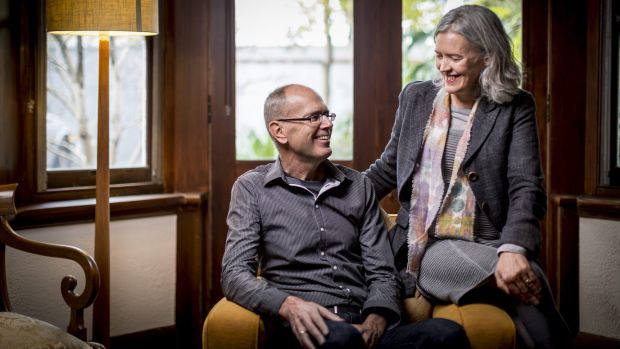
Rob Trinca, pictured with wife Jane Sandow, was diagnosed with dementia in his early 50s. Photo: Eddie Jim
Architect Rob Trinca was only 49 when he noticed he was having trouble drawing. His doctor thought he was depressed.
It took four years of increasing frustration and confusing to arrive at the real diagnosis in 2011: posterior cortical atrophy (PCA), a form of dementia that steadily erodes a patient’s visual recognition skills. By 2012, aged only 54, Mr Trinca had to give up his job.
“I found it was harder and harder to do work that I could normally do quite easily.”
Mr Trinca is one of the 25,100 Australians under the age of 65 with dementia, according to Australia’s largest Alzheimer’s charity. It’s considered a disease of the very old, but one in 13 dementia patients is under retirement age, and it’s been diagnosed in those in their 40s and 30s.
The Oscar-nominated film Still Alice has raised awareness of the disease, along with the public battle of author Terry Pratchett, who also had PCA.
Alzheimer’s Australia’s Victorian chief executive Maree McCabe said it could take up to seven years for doctors to diagnose a patient with early onset dementia because doctors were not looking for the disease
“There is certainly a misapprehension that only older people get dementia, which we know is not the case,” she said.
Symptoms of early onset dementia included memory loss, changes in mood and personality, trouble concentrating and a disinhibited disposition. People with early onset dementia also risked being misdiagnosed with depression, Ms McCabe said.
Mr Trinca’s wife, Jane Sandow, a landscape designer, said her husband’s general knowledge was still intact but his visual memory was a problem and he had trouble reading and writing.
“It limits the amount of work I can do,” she said. “More time is spent supporting Rob and ensuring he has a higher quality of life.”
Mr Trinca’s diagnosis came at a time when the Windsor couple still had to worry about their mortgage and school fees for their two children, who are now aged 24 and 21.
The Alzheimer’s Australia data predicts that by 2050, almost 1 million people – including 36,800 below the age of 65 – are expected to be living with dementia.
The figures, compiled by Deloitte Access Economics using Australian Bureau of Statistics data, were released on Thursday as part of Alzheimer’s Australia’s “No longer a statistic” campaign.
Ms McCabe said she was concerned that the state’s only existing program helping people with early onset dementia and their families could be lost if it is rolled into the National Disability Insurance Scheme next year.
“The NDIS not able to meet unique needs of people living with early onset dementia and we’re working with government to come up with a solution,” she said.
Mrs Sandow said the program had made a “massive difference” in helping her family adjust to Mr Trinca’s diagnosis.
“The NDIS only focuses on the person with dementia, rather than the whole family,” she said.
